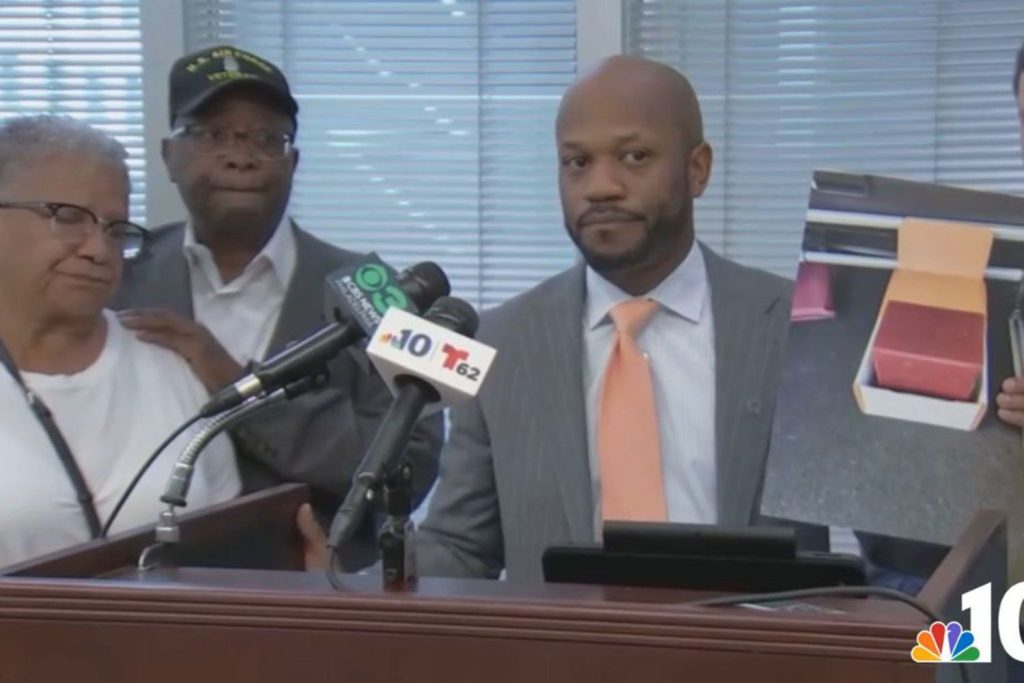:max_bytes(150000):strip_icc():format(jpeg)/Abbey-and-Lawrence-Butler-072625-8ea950b50ee1430fa19939575812eada.jpg)
NEED TO KNOW
- A couple in Pennsylvania is suing two funeral homes because they claim they were given their dead son’s brain in an unlabeled box
- Lawrence and Abbey Butler said the box began to smell and leak into their car, and the remains eventually made contact with Lawrence’s hands
- The Butlers’ son — a 56-year-old Marine veteran working as a financial aid director — died in Georgia in 2023
A couple in Pennsylvania is suing two funeral homes because they claim they were given their dead son’s brain in an unlabeled box.
On Thursday, July 24, Lawrence and Abbey Butler were joined by their lawyers to announce a lawsuit against the two funeral homes following the 2023 death of their son, Timothy Garlington.
The pair is taking action against both Nix & Nix Funeral Homes in Philadelphia and Southern Cremations & Funerals in Georgia over what L. Chris Stewart, the couple’s attorney, called a “horrific tragedy,” per press conference footage shared by Philadelphia NBC affiliate WCAU.
As the family and their lawyer revealed while speaking with local media, and as reported by the Associated Press, the two funeral homes are accused of giving the parents their late son’s remains in an unmarked box. They claim the body part began to smell, leak into their car and even made contact with the father’s hands.
“It was, and it is still in my heart, that I got in my car and I smelled death,” Lawrence told reporters emotionally as his wife stood beside him. “We just pray that this doesn’t happen to anyone else again. I had to get rid of that car. I just couldn’t stand the idea that the remains [were] in that car.”
The Butlers’ son — a 56-year-old Marine veteran working as a financial aid director — died in Georgia in 2023, according to Stewart, before Southern Cremations shipped his body to Philadelphia’s Nix & Nix. The second funeral home was “responsible for providing personal items” to the Butlers, having placed them on a table alongside the “unmarked box,” he said.
“The items were given to the family, and they were taken home,” Stewart continued. “For them only to discover days later that there were remains in that white, unmarked box. How devastating of a mistake that was made by both funeral homes.”
As the lawyer alleged, the parents discovered they had possession of their son’s remains when their car “started to smell,” as the box began “leaking in their vehicle.” He added that there is “no reason or justification” for Garlington’s brain to have been placed “in a separate box.”
The discovery came days after Garlington’s mother unsuccessfully attempted to open the container in front of the funeral home staff, according to Stewart.
“To find out that it was his remains was just overwhelming,” Lawrence added, speaking to reporters.
“Even to this day, that they could do that. You rely on their professionalism to avoid this kind of situation. And that we would have to go through that,” he continued. “Tim was the baby boy and was a good young man. This would just double up on the fact that we lost him to this day.”
Nix & Nix and Southern Cremations did not immediately respond to PEOPLE’s request for comment on Saturday, July 26. ASV Partners, the company that owns Southern Cremations, declined to comment when contacted by the AP. According to the outlet, the Southern Cremations location is at Cheatham Hill.
Speaking to the AP, Julian Nix of Nix & Nix said “it was definitely not our fault” and claimed the first funeral home sent the parents the unlabeled box.
The owner alleged they got in contact with authorities after learning of the remains in the box, and claimed that a state board overseeing funeral homes investigated the matter and found them not responsible. Per the AP, documents proving that have not been made available.
Stewart said the family still does not know if their son’s brain was buried with him, per the AP, which added that the family is seeking both answers and compensation. Lawrence told reporters that he hopes the funeral homes “learn a lesson” from the ordeal.
“You really depend on them to get you through,” he said. “And then to find out that they did not take the care to at least know what they were sending to us. … We just trusted them to do what we thought should be done correctly. This was not done correctly at all.”

